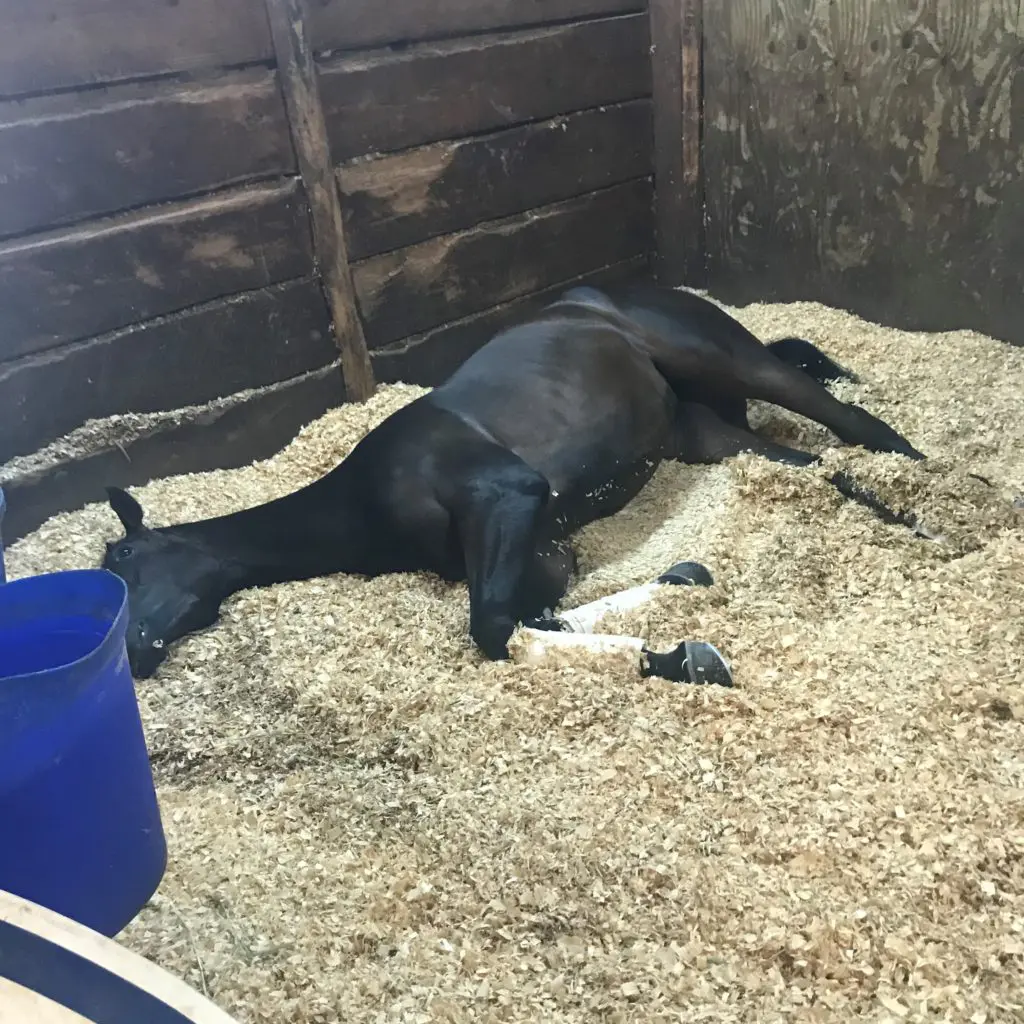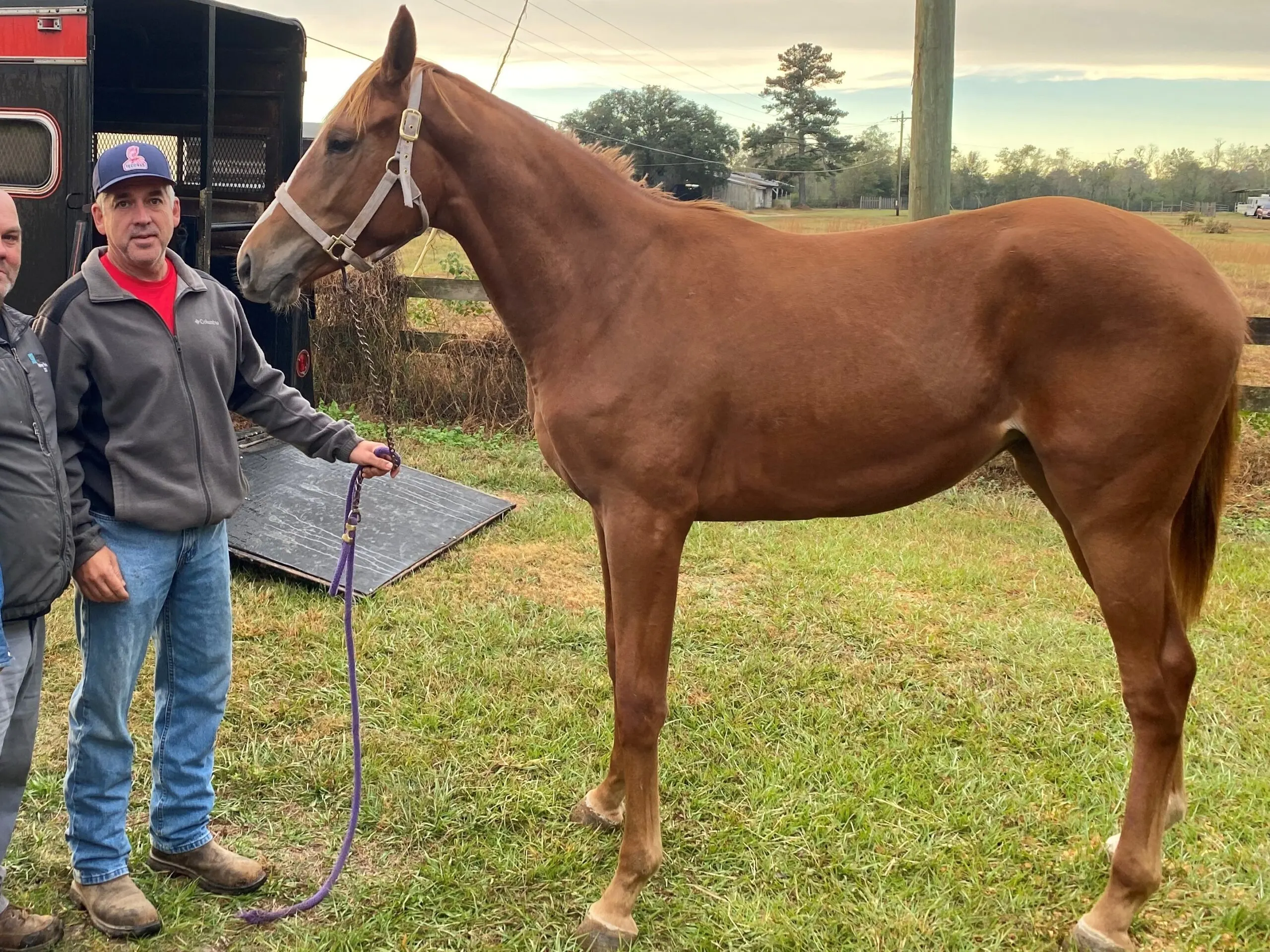Last updated: August 5, 2022
Any links on this page that lead to products on Amazon are affiliate links and I earn a commission if you make a purchase. Thanks in advance – I really appreciate it!
You probably feel like you’ve lost a good friend when your horse died and haven’t thought much about what you need to do to dispose of its body. I’ve been in this position myself and researched options on what to do with a dead horse.
You can arrange the disposal of your dead horse through your veterinarian after they’ve determined the cause. The most common way to dispose of a horses’ body is to bury it, bring it to a landfill, or have it cremated.
Horses are an integral part of many people’s families and are trusted companions. But what do you do when your horse dies, and you need to dispose of its body. That’s why we’re here; this post explains how you can dispose of them in the best way possible.

The different ways to dispose of a dead horse.
Horses are wonderful animals, but they also come with some unfortunate realities, including death. My friend recently lost a promising young colt lost from pneumonia complications; this left him and his family heartbroken.
The death of a horse is inevitable. The first time I remember this experience, I just got off the bus and saw my grandfather standing in our pasture, looking down at his buckskin lying still on the ground.
The old buckskin was my grandfather’s favorite horse; he had raised him from a colt. His death bothered me, but Grandpa did not want us to waste time grieving for him because we had to dispose of his body before it started going bad.
Burial
When the buckskin died, we didn’t have to worry about regulations. We hooked him up to a tractor and brought it deep into the woods – where we dug a deep, wide hole for our friend.
Today, burying a horse just anywhere is not an option because there are laws restricting where one can bury animals. Even though these regulations add to the red tape for those who want to bury their horses, they also help prevent disease and contamination from spreading further in our environment.
For example, some locales restrict you from putting your horse too close to water sources, while another doesn’t allow chemically euthanized animals to be buried at all. As a result of the many restrictions on burial sites, it’s important to know your local laws before burying a horse.
How to bury a horse-What you need
- Check animal burial regulations in your area: Contact local authorities or state agricultural departments to determine the laws related to animal burials. You can also visit their website and check under “Animal Ordinances.”
- Choose a site: Picking a spot to bury your horse should be done with care. High ground is preferable, and make sure that the area you choose doesn’t have any gas lines, water pipes, or other underground hazards nearby. If you have options, choose a spot outside of your pasture.
- Dig a hole: To bury a horse, the hole needs to be large, typically over six feet deep and seven-foot square. You can either hire someone or rent a backhoe for this task. A backhoe is also helpful to move the horse’s remains into the grave.
- Final steps: Use a backhoe to move your horse and any mementos into its grave. Once this is done, fill the hole. With your horse’s remains in the grave, take a moment to say goodbye one last time. This is not an easy task for any horse owner; take however much time is necessary to say goodbye.
Landfills
I’ve never brought a dead horse to the landfill before, so I contacted our local one and was surprised when they said they accept horse carcasses without charge. That’s right- you don’t need any special permits or anything like that.
The biggest obstacle you have to landfill disposal is loading the dead animal. It would be best if you had a backhoe to load your horse. Once you make it to the dumpsite, operators are on hand that will unload the animal for you.
I suggest you contact your local landfill before loading your animal’s body and driving there because they likely have different rules in each county/parish.
Incineration/Cremation
I don’t have any experience cremating a horse. So I had to do some research on this. and called LovedPets in Royal Oaks, California, and spoke to James.
He provided a lot of helpful information such as the cost: $1,250 for standard horses; $850 if they’re ponies; and a draft or warmblood are slightly more expensive at about $1,500-1,600 dollars respectively.
LovedPets make it a point to handle your loved ones with dignity and respect from the moment they arrive at their facility. They take great care to make sure that you are happy with how things proceed and never cut up a horse before cremation.
They also allow owners and friends to be present during this difficult time. After incinerating, they provide all necessary urns for ashes and put pictures on the urns if desired so that you can commemorate your beloved equine partner’s life.
LSU probably cremates horses; however, I haven’t been able to confirm it. Unfortunately, I couldn’t find any local company that offers cremation services similar to LovedPets-so if you want your horse cremated and don’t live in California, you need to check online or contact your vet!
Alternative horse disposal methods.
- Rendering– This process “cooks” the animal down into products like bone meal, which can, in turn, be used for animal feed and supplements.
- Composting– Composting a horse is not an easy task and can take up to 10 months. But doing so has some benefits; the horse’s carcass turns into rich soil that can be used as fertilizer for gardens.
- Biodigesters– A biodigester is an innovative machine that transforms an animal carcass into harmless and sterile byproducts that can be used as fertilizer.

How to comfort a dying horse
As horse owners, we accept the responsibility of making decisions about our animal’s health and well-being. Most of these decisions are pretty straightforward, like what hay to choose or how much time we’ll spend training.
However, when you own a horse, it also means facing difficult decisions such as geriatric and end-of-life care. How each person deals with it may be different, and the right choice for one horse owner may not be suitable for another. There is no perfect way to handle every situation, but here are some suggestions I hope you find helpful.
- Do something special: You might give your horse extra attention by grooming, petting, and giving them treats they love. (Be careful, don’t give them anything that could upset their digestive system)
- Take your horse out: If your horse is still mobile and able, lead it around and spend time on a special trip or walk.
- Be present: A horse has a powerful bond with its owner, so you must spend time with your animal during his final days of life.
- Remain calm: When a horse starts getting in really bad shape, they seem confused; you should be patient and remain calm during this time. Animals sense when you’re upset, and this will only cause them more distress.
Your horse’s life may be in its final hours, but it doesn’t have to end in pain. Your vet can prescribe medication for your animal so they don’t spend their last days suffering and might even recommend ways you can provide comfort or euthanasia as a humane option when the time comes.
How to make the decision whether or not to put down an animal
If you have a sick horse, you might be thinking about putting him or her down. But before you do, here are some questions that will help you make the decision:
- How long has the horse been sick? If your horse is old and has been ill for a long time, then it might be time to let go.
- Does your horse still enjoy life? Even if they can’t experience everything they used to because of their illness or injury, does he/she seem content?
- Do I want my horse to suffer any more than necessary? You should always do what’s best for your animal – if they’re in pain and showing signs that death is coming, then putting it down may be the most humane thing you have to offer.
Below is a YouTube video that explains what to do if a horse dies in a stall.
FAQ
I believe horses know when one has died because of their social structure. Horses are herd animals and form deep ties among their group. They often show signs of worry or distress when others get hurt, sick, or die. However, it’s impossible to say for certain that they mourn the death of another.
What is the dead horse theory?
The dead horse theory is based on a Native American proverb: When you find out that your “horse” isn’t going anywhere, it’s time to get off and move on! Life can change at any moment in time, and we have to adapt when things don’t go our way.
Do horses know when another horse dies?
Horses are herd animals and form deep bonds with each other. They often show signs of worry or distress when others in their group get hurt, sick, or die. Whether they mourn the death of another is a mystery – but I believe horses know when one has died.
Meet Miles Henry
An avid equestrian and seasoned racehorse owner, Miles Henry brings his extensive experience to the equine world, proudly associating with the AQHA, The Jockey Club, and various other equine organizations. Beyond the racetrack, Miles is an accomplished author, having published various books about horses, and is a recognized authority in the field, with his work cited in multiple publications.
🔗 Connect with Miles:
Twitter
Facebook
YouTube: Check out race highlights, horse care tips, and more!

